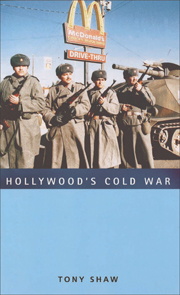Book contents
- Frontmatter
- Contents
- Acknowledgements
- List of Abbreviations
- Introduction
- 1 Love and defection
- 2 The enemy within
- 3 Projecting a prophet for profit
- 4 Of gods and moguls
- 5 Negotiable dissent
- 6 Turning a negative into a positive
- 7 A cowboy in combats
- 8 Secrets and lies
- 9 The empire strikes back
- Conclusion
- Bibliography
- Film Index
- General Index
Introduction
Published online by Cambridge University Press: 05 August 2013
- Frontmatter
- Contents
- Acknowledgements
- List of Abbreviations
- Introduction
- 1 Love and defection
- 2 The enemy within
- 3 Projecting a prophet for profit
- 4 Of gods and moguls
- 5 Negotiable dissent
- 6 Turning a negative into a positive
- 7 A cowboy in combats
- 8 Secrets and lies
- 9 The empire strikes back
- Conclusion
- Bibliography
- Film Index
- General Index
Summary
In the battle for mass opinion in the Cold War, few weapons were more powerful than the cinema. From the 1917 Bolshevik Revolution through to the collapse of the Berlin Wall in 1989, millions of people worldwide went to movie theatres every week, from the rundown fleapits of Calcutta to the air-conditioned dream palaces of California. What they saw and heard on the big screen could have a profound influence on their comprehension of the Cold War — whether it was via British-made espionage comedies of the 1950s, East German-made outer-space adventures of the 1960s, American-made ‘paranoid’ thrillers of the 1970s, or Cuban-made allegorical vampire cartoons of the 1980s.
Over the past 50 years, considerable attention has focused on the ‘Great Fear’ that swept through Hollywood during the McCarthy era. For good reason: the late 1940s and early 1950s is commonly regarded as Tinsel town's ‘darkest hour’, when producers were forced into making dozens of lurid ‘red baiting’ movies and when scores of filmmakers' careers were ruined by bogus accusations of communist subversion. More recently, historians have begun to set the American film industry's Cold War role in a wider, international context, by, for instance, highlighting Hollywood's willingness to export American ideals in line with the US State Department's wishes. However, this celluloid ‘cultural diplomacy’ has yet to make serious inroads into mainstream Cold War historiography, while only a few scholars have taken the lead from the revelations of Hollywood-State Department collaboration to search for potential links between the film industry and other government agencies during the conflict.
- Type
- Chapter
- Information
- Hollywood's Cold War , pp. 1 - 8Publisher: Edinburgh University PressPrint publication year: 2007



